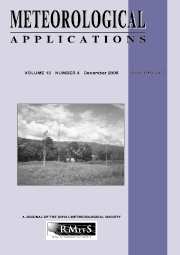Crossref Citations
This article has been cited by the following publications. This list is generated based on data provided by
Crossref.
Tyagi, Bhishma
and
Satyanarayana, A. N. V.
2013.
Assessment of turbulent kinetic energy budget and boundary layer characteristics during pre-monsoon thunderstorm season over Ranchi.
Asia-Pacific Journal of Atmospheric Sciences,
Vol. 49,
Issue. 5,
p.
587.
Tyagi, Bhishma
and
Satyanarayana, A. N. V.
2013.
The Budget of Turbulent Kinetic Energy during Premonsoon Season over Kharagpur as Revealed by STORM Experimental Data.
ISRN Meteorology,
Vol. 2013,
Issue. ,
p.
1.
Struckmeier, Caroline
Drewnick, Frank
Fachinger, Friederike
Gobbi, Gian Paolo
and
Borrmann, Stephan
2016.
Atmospheric aerosols in Rome, Italy: sources, dynamics and spatial variations during two seasons.
Atmospheric Chemistry and Physics,
Vol. 16,
Issue. 23,
p.
15277.
Barman, Nilamoni
Borgohain, Arup
Kundu, S. S.
Roy, Rakesh
Saha, Biswajit
Solanki, Raman
Kiran Kumar, N. V. P.
and
Raju, P. L. N.
2019.
Daytime Temporal Variation of Surface-Layer Parameters and Turbulence Kinetic Energy Budget in Topographically Complex Terrain Around Umiam, India.
Boundary-Layer Meteorology,
Vol. 172,
Issue. 1,
p.
149.
Tian, Yue
and
Miao, Junfeng
2019.
A Numerical Study of Mountain-Plain Breeze Circulation in Eastern Chengdu, China.
Sustainability,
Vol. 11,
Issue. 10,
p.
2821.
Gobbi, G.P.
Barnaba, F.
Di Liberto, L.
Bolignano, A.
Lucarelli, F.
Nava, S.
Perrino, C.
Pietrodangelo, A.
Basart, S.
Costabile, F.
Dionisi, D.
Rizza, U.
Canepari, S.
Sozzi, R.
Morelli, M.
Manigrasso, M.
Drewnick, F.
Struckmeier, C.
Poenitz, K.
and
Wille, H.
2019.
An inclusive view of Saharan dust advections to Italy and the Central Mediterranean.
Atmospheric Environment,
Vol. 201,
Issue. ,
p.
242.
Večenaj, Željko
Malečić, Barbara
and
Grisogono, Branko
2021.
Estimation of Turbulent Triplet Covariances for Bora Flows.
Fluids,
Vol. 6,
Issue. 12,
p.
452.
Barman, Nilamoni
Borgohain, Arup
Kundu, Shyam S.
and
Kumar, N. V. P. Kiran
2021.
Seasonal variation of mountain-valley wind circulation and surface layer parameters over the mountainous terrain of the northeastern region of India.
Theoretical and Applied Climatology,
Vol. 143,
Issue. 3-4,
p.
1501.
Pérez Albornoz, C.
Escalante Soberanis, M.A.
Ramírez Rivera, V.
and
Rivero, M.
2022.
Review of atmospheric stability estimations for wind power applications.
Renewable and Sustainable Energy Reviews,
Vol. 163,
Issue. ,
p.
112505.
Rahman, Kalimur
Rios, Gabriel
Gamarro, Harold
Addasi, Omar
Peña, Jean Carlos
Gonzalez-Cruz, Jorge
Bornstein, Robert
and
Ramamurthy, Prathap
2024.
The boundary layer characteristics of coastal urban environments.
Theoretical and Applied Climatology,
Vol. 155,
Issue. 7,
p.
6931.
Barman, Nilamoni
Roy, Indranil
and
Gayen, Anadi
2024.
Investigation of land–atmosphere interaction at a high altitude (5330 m a.s.l.) snow covered station of East Himalaya.
Meteorology and Atmospheric Physics,
Vol. 136,
Issue. 6,
Benítez-Valenzuela, Lidia Irene
Sánchez-Mejía, Zulia M.
and
Yepez, Enrico A.
2025.
Semiarid Coastal Ecosystems—Atmospheric Interactions: A Seasonal Analysis of Turbulence and Stability.
Meteorology,
Vol. 4,
Issue. 1,
p.
2.

